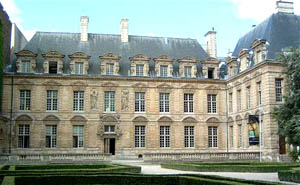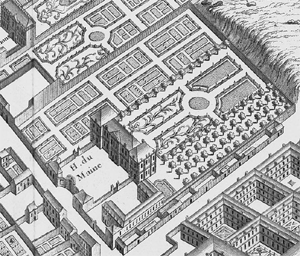Types of Castle and The History of CastlesTown Houses & Hôtels Particuliers |
|
|
|||||||||||||||||||||||||||||||
Town Houses
A townhouse is the term used in the United Kingdom, Ireland and in many other English speaking countries to describe a residence of a member of the aristocracy in the capital or major city. Such potentates generally owned country houses in which they lived for much of the year. During the social season when major balls took place and when parliament was in session, peers and their servants moved to live in their townhouse in London. Today the term townhouse is used in other ways, largely under the influence of tacky realtors trying to give their tacky properties an air of prestige. In many countries it is used to describe terraced housing - the connection being that some smaller town-houses were terraced. Even the greatest potentates, often lived in terraced houses in town. For example the Duke of Norfolk owned Arundel Castle in the country, while his London house was a terraced house called Norfolk House in St. James's Square - although that particular terraced house was over 100 feet (30 metres) wide. Many townhouses were demolished or ceased to be used for residential purposes following the First World War. The larger town houses often came into the ownership of government institutions or private clubs. In the post World War II period large terraced houses in general in London and other British cities were divided into flats or converted into offices. However, in the early 21st century this trend is being reversed to some extent, as there is less demand for old houses as offices nowadays since open plan layouts are preferred, and the number of very rich people in London has risen. Nowadays British property developers and estate agents often call new terraced houses townhouses, probably because the aristocratic pedigree of terraced housing is widely forgotten, and for many people the main mental association of terraced housing is with working class terraced housing. "Townhouse" still has more exclusive connotations.
|
|
||||||||||||||||||||||||||||||
 |
|||||||||||||||||||||||||||||||
Famous townhouses
Bucking Palace, London - originally the townhouse of the Duke of Buckingham, and still known to Londoners as Buckingham House, not Buckingham Palace. Bute House, Edinbugh- Former residence of the Marquis of Bute in Edinburgh's Charlotte Square, now the official residence of the First Minister of Scotland. Somerset House. Originally built by the Duke of Somerset and laterly used for a series of government functions. 10 Downing Street, London - a georgian terraced house, the residence of the Prime Minister of the United Kingdom 11 Downing Street, London the Chancellor of the Exchequer of the United Kingdom Spencer House, London - formerly the London residence of the Earls Spencer Marlborough House, London - now the home of the Commonwealth Secretariat, earlier the residence of the Prince of Wales and later Queen Mary the Queen Mother (1936-1953) Clarence House, London- the residence of the late Queen Elizabeth the Queen Mother and now the residence of Charles, Prince of Wales Leinster House, Dublin,- residence of the Duke of Leinster ( Ireland's premier duke) and now the seat of Oireachtas Éireann, the Irish parliament. Powerscourt House - Dublin residence of Viscount Powersourt, a prominent Irish peer. It was converted into an award-winning shopping centre in the 1980s.
|
|
||||||||||||||||||||||||||||||
|
|
|||||||||||||||||||||||||||||||
Hôtels Particuliers
An hôtel particulier is a grand townhouse, generally in a city in a French speaking country. The word Hôtel originally referred to the townhouse of a nobleman. While an ordinary maison (house) was built as part of a terrace, sharing party walls with the houses on either side and directly fronting on a street, an hôtel particulier was often free-standing. By the 18th century it would always be located between an entrance court, the cour d'honneur, in front and a garden behind. There are hôtels particuliers in many large French cities, such as Paris, Bordeaux, Albi, Aix en Provence, Avignon, Caen, Lyon, Montpellier, Nancy, Rouen, Rennes, Toulouse and Troyes and in other once rich towns, for example the Bastide in Carssonne. The city townhouse of the French nobleman was used not as a permanent home but as a private place of temporary lodging, often with a permanent staff. The term was the equivalent in medieval England to the word "Inn". Almost every great nobleman possessed an inn, generally within the City of London. Both the English words "hotel" and "inn" developed a more specific meaning as serviced rooms for rent. The medieval townhouse of the Earl of Northumberland would have been known as "Northumberland's Inn", but a later version is called "Northumberland House" . Modern French also applies hôtel to commercial non-private hotel. the Hôtel de Crillon on the Place de la Concorde was built as an hôtel particulier and is today a public hotel. The Hôtel des Invalides retains its early sense of a hospice for war wounded. An hôtel de ville is a mairie or town hall. Other official bodies might give their name to the structure in which they maintained a seat, Several French cities have an Hôtel de Cluny, maintained by the abbey of Cluny. The Hôtel de Sens was built as the Paris residence of the archbishop of Sens. An Hôtel-Dieu ("hostel of God") is the old name given to the principal hospital in French towns. Police stations located in old hôtels particuliers, are called hôtels de police.
Paris
In Toulouse
In Rennes
|
|
||||||||||||||||||||||||||||||
|
|||||||||||||||||||||||||||||||
Hôtels Particuliers - Photographs |
|
||||||||||||||||||||||||||||||
|
|
|
|||||||||||||||||||||||||||||
|
|
|||||||||||||||||||||||||||||||
|
|
More on Types of Castle and History of Castles
Click on any of the following links to learn more about specific types of castle
|
|
|||||||||||||||||||||||||||||
|
|
|||||||||||||||||||||||||||||||
|
|
|
|
|||||||||||||||||||||||||||||
|
|
|
||||||||||||||||||||||||||||||
|
|
|||||||||
| :::: Link to us :::: Castle and Manor Houses Resources ::: © C&MH 2010-2014 ::: contact@castlesandmanorhouses.com ::: Advertising ::: |
























